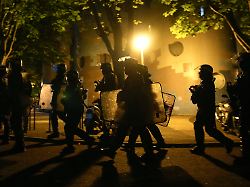Probably hit by a rubber bullet
France’s judiciary is investigating a death during protests
7/5/2023 6:37 p.m
The situation in France is gradually calming down and the protests are dying down. Now the processing follows. A man was killed during the protests – possibly by a rubber bullet from the police. The public prosecutor’s office is now investigating because of bodily harm resulting in death.
The violent unrest in France has continued to subside. “The situation has almost normalized,” said Prime Minister Elisabeth Borne. However, the judiciary is investigating two cases in which young men may have been hit by police rubber bullets. A 27-year-old in Marseille was killed on Sunday night, and another young man from Mont-Saint-Martin near the Belgian border was in a coma.
In the case of the 27-year-old, the public prosecutor’s office is investigating because of bodily harm resulting in death. The police supervisory authority was also involved, according to investigators. But it is still unclear whether there is a connection with the unrest. The lawyer for the young man in a coma announced that he would file a charge of attempted manslaughter. The use of rubber bullets is controversial in France. During the social protests of the so-called yellow vests in 2018/19, several people were injured by rubber bullets.
The unrest in the suburbs, which has been going on for a week, flared up after the shooting of a 17-year-old Nahel M. by a police officer during a traffic stop. According to the Ministry of the Interior, only 16 people were arrested on Wednesday night, and eight buildings were damaged. According to the information, there were also around a hundred fires in public spaces, primarily burning garbage cans. About 80 vehicles burned down.
Overall, the riots were less extensive than on the previous nights. Buses and trams were scheduled to resume normal operation across the country on Wednesday evening after several evenings and nights of suspension due to the riots.
“I hope that the policeman will be convicted”
Again, 45,000 security forces were deployed across the country on Wednesday night. French President Emmanuel Macron had confirmed that the massive police presence would be maintained. Since the unrest began on June 27, around 3,600 people have been arrested, almost a third of them minors. About 990 were brought before a judge, of whom 380 were arrested.
The French government announced that it might restrict the use of online networks in the event of further unrest. It is conceivable, for example, to temporarily switch off the location services, said government spokesman Olivier Véran. In recent unrest, rioters are said to have used such services to rally in zones of conflict. However, Véran emphasized that there could be no talk of a general shutdown.
The father of Nahel, who was shot dead by a police officer, announced that he would appear as a joint plaintiff in the process. “I hope that the police officer will be convicted,” he said. “He took all my hope away from me.” According to his own statement, the father had no contact with his son, but never gave up hope of getting closer to him one day.
accusation of racism
The relationship between the authorities and the population of the Parisian suburbs has been tense for years. The police in particular are accused of racist behavior. According to criminologist Sebastian Roché, the dead in police operations are disproportionately likely to belong to ethnic minorities, he told the regional newspaper “La Voix du Nord”. In his opinion, the French police are the deadliest in Europe, as he in turn told Die Zeit.
Political scientist Jacques de Maillard agrees with the criminologist: “The deteriorating relationship between the police and young working-class men who belong to ethnic minorities is a key element of the situation in France,” he told DW. An evaluation by the independent authority “Défenseur des droits” also shows that dark-skinned and North African men are 20 times more likely to be subjected to identity checks than the rest of the population.
The UN human rights commissioner called on France “to seriously deal with the profound problems of racism and racial discrimination in law enforcement”. The French Foreign Ministry has described allegations that the police are racist or structurally discriminatory as unfounded.
